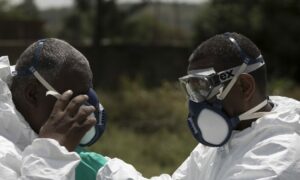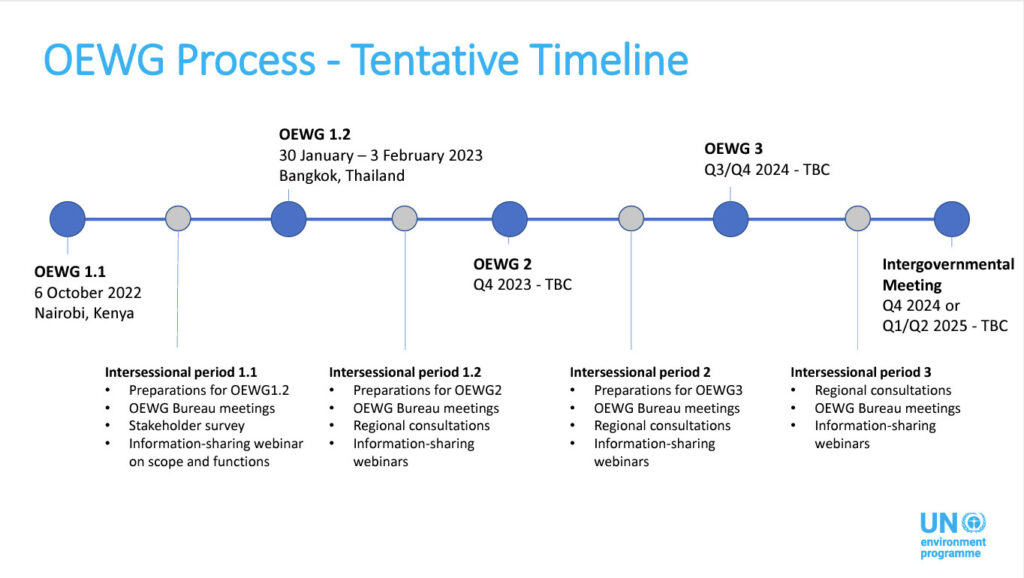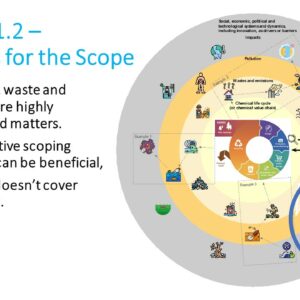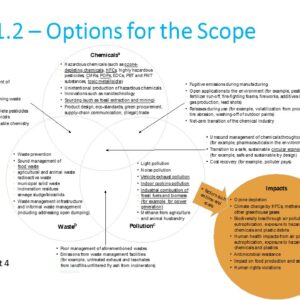Événement Conférence
Briefing on the 1st Session of the Ad Hoc Open-Ended Working Group on the Science-Policy Panel to Contribute Further to the Sound Management of Chemicals and Waste and to Prevent Pollution

12 Jan 2023
13:30–15:00
Lieu: International Environment House I, Room 3 & Online | Webex
Organisation: Geneva Environment Network, Programme des Nations Unies pour l'Environnement
This briefing on the second part of the 1st Session of the Ad Hoc Open-Ended Working Group on the Science-Policy Panel to Contribute Further to the Sound Management of Chemicals and Waste and to Prevent Pollution (OEWG 1.2) taking place in Bangkok, Thailand, from 30 January to 3 February 2023, was held within the framework of the Geneva Environment Network.
About this Session
In its resolution 5/8, the United Nations Environment Assembly (UNEA) decided that a science-policy panel should be established to contribute further to the sound management of chemicals and waste and to prevent pollution. UNEA further decided to convene, subject to the availability of resources, an OEWG to prepare proposals for the science-policy panel, to begin work in 2022 with the ambition of completing it by the end of 2024.
The ad hoc Open-Ended Working Group on the Science-Policy Panel (OEWG 1.2) will be held in person at the United Nations Conference Centre in Bangkok, Thailand, from 30 January to 3 February 2023.
This event, held a few weeks ahead of the OEWG 1.2 Session, provided updates on the preparations of this important event and how stakeholders can engage in the process.
Speakers
By order of intervention.

Kevin HELPS
Principal Officer, Science-Policy Panel on Chemicals, Waste and Prevention of Pollution, United Nations Environment Programme

Teeraporn WIRIWUTIKORN
Specialist on Waste and Hazardous Substance Management, Pollution Control Department, Ministry of Natural Resources and Environment, Thailand

Lesley ONYON
Head, Chemical Safety and Health Unit, Department of Environment, Climate Change and Health, World Health Organization

Giulia CARLINI
Senior Attorney in the Environmental Health Program, Center for International Environmental Law (CIEL)
Video
Highlights
#LIVE now!
Join stakeholders from Member States, civil society, private sector to academia, to learn how they are mobilizing for #OEWG1.2 on #SPPCWP.
▶️ https://t.co/bKYDHGjDWy pic.twitter.com/a1PMiAvOIQ
— GENeva Environment Network (@GENetwork) January 12, 2023
Summary
Welcome
Jacqueline ALVAREZ | Chief, Chemicals and Health Branch, Economy Division, UN Environment Programme
The new panel is an extremely important element in the three environmental dimensions that need to be addressed. As we try to phase out the triple planetary crisis involving climate, biodiversity, and chemicals and pollutions, two of these already have the scientific basis and bodies contributing fully to the development of of the science needed to address them.
In the area of chemicals, waste and pollution, we didn’t have that until the UN Environment Assembly decided to establish a process to create this new science-policy panel. It is a great opportunity to embrace and to create something that can make a difference.
Putting things forward from the scientific community has been essential, but it is also very critical to see how this interface can be taken up by the different possible agents of change.
For Geneva, it is extremely relevant as well as Geneva has a very strong scientific basis, not only at the level of universities but at the level of research and different activities taking place.
I would like to encourage everyone to follow the process closely as we are shaping a new panel, that can have a lot of teeth if we are smart enough to create it in that way.
Update on Preparations for the resumed first session of the Ad hoc open-ended working group on a science-policy panel to contribute further to the sound management of chemicals and waste and to prevent pollution (OEWG 1.2)
Kevin HELPS | Principal Officer of the Science-Policy Panel on Chemicals, Waste and Prevention of Pollution, UNEP
Background | The Science-Policy Panel (SPP) comes from UNEA resolution 5/8, in order to deal with one of the triple planetary crisis. It’s important, however, to recognize the background work in the world of chemicals, waste and pollution that has potentially become an important driver to address this.
This completes the triplet, alongside IPCC and IPBES. The goal is to be able to come up with better integration with the other scientific bodies. It aims to complete the OEWG process, and hold an intergovernmental meeting at the end of 2024. There’s a lot of work to be done.
Timeline

Outcomes of OEWG1.1 | With close to 500 participants representing over 80 Member States, UN entities, MEAs, SAICM, accredited IGOs and NGOs, academia and private sector/industry.
- Election of 7 of 10 Bureau Members (list of members), including the Rapporteur and Chair
- Pending finalization of Bureau election
- Eastern Europe group to finalize Bureau membership, Western Europe and other group to elect one more
- Iraq Vice-Chair to be replaced by China for Asia-Pacific group
- Adoption of UNEA Rules of Procedure to apply mutatis mutandis for the OEWG
- Initial exchange of views on the establishment of a science-policy panel
OEWG 1.2
Practical Information | As the resolution requires to start its work in 2022, the first session was divided into two sessions, with the substantial matters to be discussed in the second part.
- OEWG 1.2 will take place in-person from 30 January to 3 February 2023, with regional and other preparatory meetings on 29 January 2023 in the UN Conference Centre, ESCAP, in Bangkok. → Registration extended until 20 January 2022.
- Application for travel support now closed. Member States and groups are encouraged to go to Regional Bureau member concerned, should the case be necessary.
- Meeting documents and other information available on the website.
Click on the subjects to expand the text.
OEWG Process — Budget Status | Thank you to governments of France, Germany, Norway, Switzerland and the UK for their financial contributions.
- Estimated total cost for the OEWG process: 8.25 million USD (including support for the participation of eligible countries and stakeholders, venue and conference services)
- Total contributions & pledges received to date: 2.35 million USD (resources available to cover the OEWG 1, while most Secretariat costs covered so far by UNEP)
- Two JPO positions confirmed, from China and France
- Proposals currently being developed for additional support
- Member States in a position to do so invited to provide financial contribution delivery of the process, including the secretariat
Stakeholder Engagement | A lot of work has been done, including with IGOs (WHO, IOMC member organizations), relevant MEAs (inc. BRS, Minamata, Montreal and SAICM), other panels and assessment bodies and processes, civil society, academia and private sector.
The intersessional period will have:
- Opportunities for outreach/back-to-back meetings with relevant Conferences and COPs & other relevant regional meetings
- Stakeholder Engagement Survey (See more info)
- Webinar series
- 25 July 2022: Introducing the science-policy panel
- 5 October 2022: Lessons learned from WHO, IPCC, IPBES, IRP, Ozone
- 24 January 2023: Scope and functions of the Panel
- End February 2023: OEWG 1.2 follow up
- More to be developed in 2023 on: Academia and industry involvement, OEWG 2 overview, OEWG 2 outcomes, Horizon scanning in the SPP
OEWG National Focal Points | Member States are invited to designate National Focal Points to the SPP OEWG process, as there are only 109 Members States that have nominated to date.
Designations to be submitted through formal letter from the Ministry or Note Verbale from the Embassy or Permanent Mission to: unep-sgb@un.org, copy to spp-cwp@un.org.
OEWG 1.2 Technical deep-dive dialogues | To be held in the margins of OEWG 1.2 (Monday and Tuesday lunch time)
To further inform the OEWG discussions on scope and functions of the panel through an inclusive dialogue across stakeholder groups including governments, Secretariats of relevant multilateral environmental agreements (MEAs) and international organisations, civil society, academia, industry / private sector.
Currently in development, including Identification of experts from broad range of disciplines.
Teeraporn WIRIWUTIKORN | Specialist on Waste and Hazardous Substance Management, Pollution Control Department, Ministry of Natural Resources and Environment, Thailand
Information for Participants | Quick Links
- Logistics note for participants
- Venue
- Health measures:
- Tourist information
Visa Facilitation | Thai government has been working with the Secretariat to ease the implication of participants who encounter difficulties in applying for a Thai VISA at Thai Embassies outside their own countries since mid-December 2022 and receiving all necessary documents of such participants last week. Then, some participants have been requested to confirmed and submitted some missing information during this week.
Either participants who are still facing a difficulty in applying a visa at the Thai Embassies outside your countries or who would like to confirm whether you are include in our list, please contact teeraporn.w@pcd.go.th and provide us your following documents asap, no later than 13 Jan 2023, 16.00 (local Bangkok Time).
By next week, all necessary documents of participants who request for the assistance on VISA application will transfer to our immigration office to request for a visa exemption to entry and stay in Thailand during the meeting and to our Airlines Operation Committee (AOC) to contact all airlines to allow all participants for all flights check-in at departure and connecting airports.
- A copy of your passport
- A copy of your personal invitation letter issued by UNEP
- A copy of your e-ticket or itinerary
Welcome Reception

OEWG 1.2 – Welcome Reception
Thailand perspectives on the establishment of CWP SPP:
Scopes of the Panel:
- Objectives:
- Supporting the proposed draft overall objective in principal with minor amendments, including the term “and life cycles”.
- Also supporting the concept idea of balancing between specificity and flexibility when developing specific objectives which should reflect the desirable or ultimate expectations of the panel as well.
- Conceptual framework:
- Key highlighted MEAs and relevant entities being supported by the panel:
- The Beyond 2020 instrument;
- C&W Conventions;
- New ILBI on Plastic Pollution;
- among others.
- Principal functions: proposing that its function should include the overlook through the overlapping, linking or cross cutting issues among C&W Conventions/the beyond 2020 instrument/new ILBI on Plastic Pollution and between C&W and other MEAs, e.g. UNFCCC (climate change VS pollutions), CBD (biodiversity loss VS pollutions), Montreal (hazardous chemicals VS ozone depletion), MARPOL 73/78 (ESM of waste), etc.
- Also proposing to start the initial discussion and identification of key elements for governing structure of the panel or suggestion on the way forward for further work during intersessional period.
WHO and the Science-Policy Panel
Lesley ONYON | Head, Chemical Safety and Health Unit, Department of Environment, Climate Change and Health, WHO
We, at the WHO, are in a similar position with other stakeholders. There’s a lot of detailed information to reflect on. It’s a very good opportunity this afternoon to have an interactive discussion.
WHO is very committed to this process. The burden of disease shows no signs of decreasing. Despite our many successes in our efforts, we still see a quarter of all global deaths can be attributed to the environment.
As such, the scope for avoiding deaths and injuries is huge. We know that half of the burden of disease can be attributed to air pollution: 7 million of 14 million that can be attributed to the environment can be attributed to air pollution. We know chemicals come in at quite a relatively small amount at 1.6 to 1.8 million. However, the methodologies and the data on the impacts of chemicals leave a lot of questions. We think this is the tip of the iceberg.
Health is a very important reason why we need to manage chemicals, deal with waste, and prevent pollution. These deaths are all avoidable. Whilst they can have a dramatic impact at the individual and family level, at the society level, the impact on the health system is enormous. As deaths and illnesses can be preventable, we free up the health system for other more life-affirming measures to everyone’s benefit.
We have been involved in many of the processes of the multilateral environment agenda, and continue to do so. We see that health is not yet integrated into the processes at an optimal level. We’re still discussing ways of strengthening involvement in different forums such as the Strategic Approach to International Chemicals Management. How best health can be integrated in the science-policy panel is an issue where we’re hoping to come up with creative solutions collectively over this OEWG process.
WHO, being a specialized UN agency has many scientific processes which are our bread and butter of work: developing risk assessment methodologies for chemical assessments, identifying health protective interventions, among others. We’re happy to share these experiences, and create better awareness on the range of work WHO does in relation to the science-policy process.
We also have other examples of rigorous procedures for protecting against conflict of interest, which will be very important in the work of the science-policy panel. This is particularly based on the Framework Convention for Tobacco Control where we have many years of experience.
On the functions and scope of the panel, there is a great many existing processes to navigate around. It’s important to think about what could be missing or common to many in the existing processes.
There are many proven interventions and guidance developed under these different intergovernmental processes but yet implementation on the ground is far from ideal. We hope this could be something that can be addressed in the science-policy context. Horizon-scanning is important for us all, and this is something best done once rather than many times by different organizations.
We think that in order to move implementation on the ground, we need to do much more work identifying win-win interventions that can demonstrate how beneficial they are, not only in saving lives and preventing diseases, but in having them economically beneficial as well.
Looking at the IPCC and IPBES processes, we see the processes take many years. We need to look at more high level strategic functions, as opposed to carrying more operational, programmatic work already done by existing systems.
The fact the science-policy panel is modeled based on the triple planetary crisis, we need to look at how this third pillar will interact with the other two.
As UNEA invited WHO to play a role as appropriate, clearly we are committed and involved. However, stakeholders need to understand that the UNEA rules and procedures that have been adopted for the work of the OEWG invite WHO as an observer.
We hope stakeholders at OEWG call on us to provide insight and information we may have, and even our views, so that we’re not just observing. In discussing with the secretariat, there are other measures that have been considered, such as being part of the technical advisory group. We’re interested to explore with the secretariat and stakeholders how we can best contribute with the process, bearing in mind formal UNEA procedural restrictions placed upon us.
Stakeholders Mobilization
Civil Society Mobilization | Giulia CARLINI | Senior Attorney in the Environmental Health Program, Center for International Environmental Law (CIEL)
Civil society is included in the Resolution’s mandate. In Article 5, it says that “the [OEWG] will prepare proposals for the science-policy panel to consider the following issues,” including, “relationships of the panel with relevant key stakeholders, including governmental and non-governmental organizations, and civil society.”
What do we mean with civil society?
Civil society as public interest organizations, actors not-dependent on profit, with the public’s well-being as a priority.
They are have been proven useful to engage with because they both represent affected populations and communities, as well as a resource providing data from the ground on chemicals, waste and pollution. Examples include lead paint: believed to be eliminated, until civil society brought scientific evidence of its being widely available for use in homes, schools in LMICs.
What can be the concrete role of CSOs in the SPP?
The role that would benefit the most from their presence: CSOs as active players in the governance and work of the future panel:
- Participate in all aspects of the deliberative work, and
- Be directly involved in the work of the governing bodies of the panel, as non-voting member (from the submission of inputs to agenda-setting, & so on)
This will increase transparency, facilitate the ownership.
Challenges of civil society mobilization in OEWG
- Existing appetite to engage, but very limited resources. Compared to other processes, there will be relatively less members of civil society that can be present in Bangkok.
- The 2022-2023 meetings agenda is already crowded, which can be challenging for small delegations.
To make the best use of CSOs presence in Bangkok, we need to build on the engagement and participation of CSOs at OEWG1 in Nairobi, where we heard from Major Groups (NGOs, women, children and youth, technology and scientific community), with UNEA Rules of Procedure used for the OEWG process.
We also saw single organization stakeholders able to express their views. This approach uses the best practices from UNEA but also BRS, SAICM, where single NGOs can intervene too, including contact groups. This broadens perspectives, by involving the highest possible level of expertise and knowledge.
Key Challenges for negotiators related to stakeholders in the SPP: Protecting science and the SPP from vested interests
Negotiators need to get it right from the beginning, who need to answer the following questions: How will “observers” be defined? Who will be invited to sit at the SPP and who is not welcome?
There is a difference between public interest organizations, versus entities with a vested financial interest in the marketing of hazardous substances.
In 2021, UN Special Rapporteur on Toxics published a report on the Right to Science where he identified threats against science and scientists. These include industry’s tactics to “divert and delay”, arising from the “tobacco industry playbook” from the 1950s that the certain chemical industries still use to delay regulations on toxics, and the conflict of interests.
Right now, the rules to participate as an observer does not include a declaration of conflict of interest, and there are no rules in the negotiations to avoid the conflict of interest.
Looking at the future SPP, which will have its own rules: it will be crucial to draft rules to protect the panel from vested interests, for the own credibility of the SPP and to ensure this doesn’t undermine its efforts.
For example: the WHO Framework Convention on Tobacco Control in regard to the tobacco industry: Early in that process, the perpetrator of the tobacco epidemic, the tobacco industry, was formally excluded from participation. There are also other lessons learned from existing panels (IPCC/IPBES…).
To conclude, in practice, public interest CSOs in the SPP will contribute to:
- Higher transparency and credibility;
- Likelihood of the acceptance of the findings of the SPP
- Facilitate implementation of the SPP activities and increase political impact.
Science does not benefit society unless it is translated into real measures that provide protection to the population, operationalized into legislations, turned into action, without delay. Public interest organizations are ready to continue working on this.
Private Sector Mobilization | Martin KAYSER | Senior Vice President, Corporate Projects, BASF
We are in times of change. The private sector – industries and companies – are facing multiple transitions, including (1) transition towards climate neutrality, (2) digitalization, (3) transition towards a more circular economy, and (4) transition to safe and sustainable by design products.
At the same time, regulations are revised and new regulations are proposed and implemented in many countries and regions.
For these transitions companies have to change and massively invest in several areas, including research and innovation, the development of new products, production, distribution and disposal.
What is not clear in the private sector is that an improved chemical and waste management, governed by SAICM, is a core element of these transition pathways. SAICM, as a multi-stakeholder process, offers the opportunity for the private sector to fully engage and help creating and designing solutions for the challenges we are facing.
I am convinced that, if we want to be successful, we should not only work together, but do this in an open-minded way, respecting and trusting each other. We need clear rules and procedures.
For me, a successful outcome could result in the development and implementation of a balanced mix of regulatory measures and voluntary initiatives.
To achieve this, we need all actors in the value chain engaged. The chemicals industry is especially affected. ICCA (the global voice of the industry) supports the concept of a Science-Policy Panel (SPP) for chemicals, waste and pollution prevention and we appreciate the opportunity to participate in these discussions.
We think the SPP should have a clear and distinct mandate, operate in an advisory capacity and have a multi-stakeholder and geographically balanced representation.
We will also help motivating other industry sectors to engage: converters, downstream industries, the retail sector, the waste and recycling sector.
I believe that the private sector has an important role to play in the SPP process. Industry can provide key scientific data, manufacturing and use information on substances and industry scientists have long experience in evaluating the risk of chemicals and products.
Today, we do not have all solutions available to build a more circular economy. We need the innovation power of the private sector to find and develop new business processes and solutions. That is the reason, why it is so important to have industry fully engaged in the SPP process.
Academia Mobilization | Martin SCHERINGER | Chair of the Board, International Panel on Chemical Pollution
The IPCP is a global network of academic scientists working on chemical pollution issues, which include scientists from any discipline tackling chemical pollution. It is an accredited observer for OEWG 1.2.
The IPCP has discussed having a global science-policy panel for many years, as seen in this editorial, “Towards an Intergovernmental Panel on Chemical Pollution (IPCP)” published in 2007. At the time, this was directly modeled to the IPCC, but at the time, it was not yet the time for something intergovernmental on chemicals. We had to as a group of scientists tried to find what we can do: create IPCP.
In an article published two years ago in Science, we outlined why a global science-policy panel on chemicals and waste is needed, how it could work, and how it could be set up in a way that it complements the many existing science-policy interface bodies, which is already complex.
After this was published, we initiated a sign-on campaign in support of the proposal for an SPP, where nearly 2,100 scientists and practitioners from over 90 countries signed and expressed their support.
Preparations for OEWG 1.2
Scientific input to a science-policy panel is key. It is obvious, but not straightforward as to how this will work. We anticipate that once it is established, the role of scientists will be similar to what it is in the IPCC or IPBES: scientists will be nominated as experts who do the actual scientific work.
However, we are now in the process leading to the new panel. We think that in the negotiations and discussions, scientific input will be important. The key question for us at IPCP is, “How can academic scientists contribute to the work of the OEWG?”
We are now discussing with UNEP if/how universities may be accredited. UNEP is interested to find out this will work, and as such has welcomed applications from universities all over the world for accreditation. There are no clear rules yet as they are a different body from other organizations. IPCP will also attend OEWG 1.2.
IPCP will solicit input from scientists around the world for position papers and statements on the scope and function of the SPP.
IPCP will also coordinate contributions with other scientific societies, such as Endocrine Society, Royal Society of Chemistry or CTAC.
IPCP will run a webinar on Conflict of Interest in the Context of Chemicals and Waste Governance on 26 January, which will highlight questions and challenges on the question of vested interests in the context of the new panel.
Closing
Michel TSCHIRREN | Waste and Chemicals Focal Point, Federal Office for the Environment, Switzerland
Today’s session made it clear that the panel should and will be relevant for a range of stakeholders from around the world.
Many of the stakeholders are already much engaged and have participated in the survey, whose results of showed that regarding the scope of the panel the majority favor a broad scope broad scope. That should be taken in to account.
It is wise to have a broad scope and install good procedures for priority setting and agreeing the programme of work and budget. This way the plenary of the panel will decide on the assessments to be carried out and will not be restricted over time when new issues will come up.
To ensure a good link from the latest scientific knowledge to the policy makers, academia does have a crucial role.
Academia must therefore be very present and involved from the start. As Giulia mentioned, transparency and ownership are very important. Civil society and academia in this regard are very pertinent.
The OEWG process was established through the UNEA 5/8 resolution on the establishment of the SPP. Several speakers today have mentioned that UNEA resolution is also very complete and precise with regard to many aspects of the new SPP.
It is already clear for example that the panel will be interdisciplinary, independent, and intergovernmental.
Also the functions are actually already spelled out and not much discussion has to take place on the functions at the Bangkok meeting. We have heard this several times during this GEN briefing today.
According to the agreed UNEA resolution the functions of the panel will be: Undertaking horizon scanning; conducting assessments; identifying gaps (and Teeraporn I would argue that also implies demonstrating all existing links and ovoid overlaps); information sharing with countries and developing parties in particular.
Lesley made it clear that the nexus of health and environment is a priority of the panel. Therefore, the engagement of WHO is welcome and crucial. Martin Kayser made it clear that also the private sector engages and that there is data and information that is available and can be used. Also IPCC and IPBES were mentioned. Yes, they provide the global scientific consensus and are thus models for our new panel. We should not reinvent the wheel.
Considering all of this: We shall not reopen the elements already decided at UNEA. And we are very advanced for the new panel and we should beyond the Bangkok meeting. In terms of substance and process. Kevin spoke about the future OEWG meetings as well. And yes, those meetings can be best be prepared with the guidance of the OEWG to the secretariat in terms of draft papers that need to be prepared.
Because there is a wide range of stakeholders, there is a wide range of interest and expertise. That allows to cover a broad scope. We can join forces to make the panel a success.
Documents
Links
- OEWG-1.2 Website | UNEP
- Science policy panel on chemicals and waste and pollution | UNEP
- Developing a Global Science-Policy Panel on Chemicals, Waste and Pollution Prevention | GEN Update
- International Environmental Negotiations Agenda | GEN Update
- Webinar: Unwrapping Conflict of Interest in Chemicals and Waste Governance | IPCP | 26 January, 14:30 CET
Photo Credit
Nicholas Greenfield / UNEP






